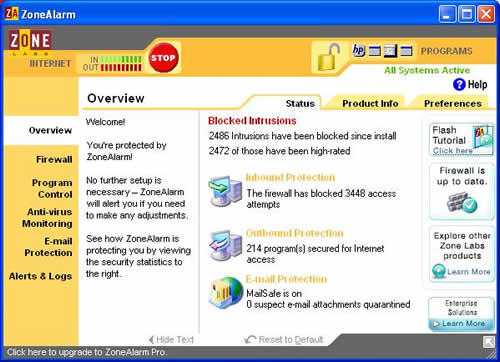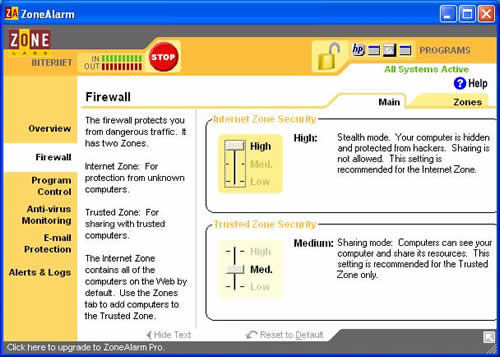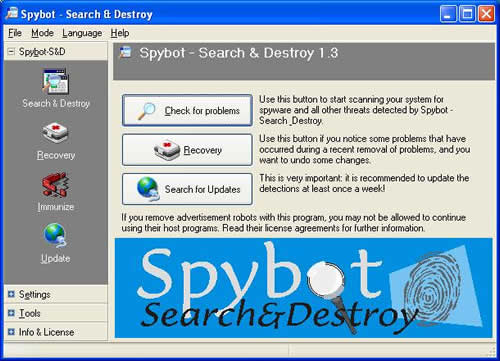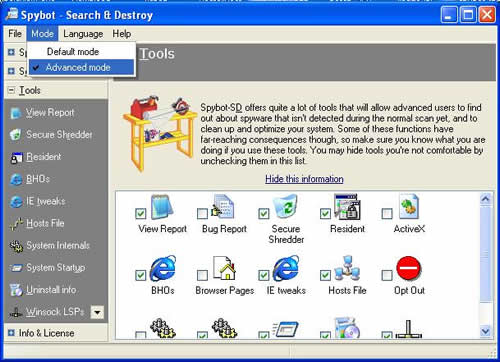One of the hazards of using a computer online today is the danger of infestation with a variety of malware, viruses, trojan horses, spyware, zombieware, worms, loggers, dialers – no matter what you're infected with, it carries the dangers of:
- Reduced performance
- Unwanted emailing
- Damage to your data, or even to your bios (which means your computer is toast)
- Theft of your data, up to and including all your personal information
When malware is released in a large network, the results can be even worse, with mass infections causing shutdowns of entire systems, theft of corporate data, and revenue loss that can rise into the millions.
Fortunately, a few free programs and sensible use of your computer can prevent these nasty things from happening to your computer.
Virus Protection
Install a decent virus protection software. You can download
AVG Anti-Virus
Free edition which is free for personal use, and ensure it's constantly updated.
AVG is easy to use, takes very few system resources, provides rapid virus database updates, and other great features like:
- Automatic update functionality
- AVG Resident Shield, which provides real-time protection as files are opened and programs are run
- AVG E-mail Scanner, which protects your e-mail
- AVG On-Demand Scanner, which allows you to perform scheduled and manual tests
- AVG Virus Vault for safe isolation and handling of infected files
- And has excellent technical help available which other free antivirus software’s lack
Firewall Protection
If your OS is Windows XP, a default firewall comes with it, but you may be better off downloading another free firewall and using it since the Windows firewall has been shown to have some of the same security holes as IE and Windows. That doesn't mean the Windows firewall is bad, it just means that using software developed by different teams of developers will protect you better.
ZoneAlarm is a great free software for home users. It has got all the features a home user needs. Has simple interface, is easy to use and customize, works with little or no configuration.
Some of the notable features of ZoneAlarm are:
- Systematically identifies hackers and blocks access attempts
- Automatically makes your computer invisible to anyone on the Internet
- Solid security foundation for your Internet-connected PC
- Provides precise security controls

 Spyware Protection
Spyware Protection
You should also keep good anti-spyware software on your computer.
Spybot - Search and Destroy is one of many good examples of these, and it's free. Be wary of anti-spyware programs that advertise via pop-ups; these "anti-spyware" programs sometimes contain some of the same problems they supposedly protect you from!
Spybot is one of the best free Anti-Spyware software, I have been using it for last couple of years. Spybot is great at keeping spyware out of the systems. The program has an easy to use interface, very user friendly system. The program takes out cookies, spyware, ads, and many other things you do not want the first time.
Some of the notable features of Spybot are:
- Removal of adware, spyware, dialers, key-loggers, trojans and other baddies.
- Removal of usage tracks
- User-extend-able database
- Save removal of threats by shredding them
- Backups of every removed problem
- Exclude option to ignore specific problems
- Permanent blocking of threatening ActiveX downloads
- Permanent blocking of known tracking cookies for IE
- Permanent blocking of threatening downloads in IE
- Command line parameters to automate tasks
- Detailed information about problems found
- Settings to automate scan, removal and update

Apart from Spyware removal Spybot has other Advanced tools like:
- Secure Shredder – Securely remove files you no longer want from your harddisk.
- BHOs – Show and manage the Browser Helper Objects from your Internet Explorer
- IE tweaks – Modify some hidden Internet Explorer settings.
- Hosts File – Take a look at your hosts list.
- System Internals – Search for registry inconsistencies
- System Startup – Show and manage the applications that your machine will run on System Startup.
- Uninstall info – Show all registered software uninstall entries
- Winsock LSPs – Show all installed network drives.
 Sensible Personal Precautions Most viruses come from your email.
Sensible Personal Precautions Most viruses come from your email. This cannot be overemphasized. Never open an email attachment that you weren't expecting; always check with the person who emailed it to you, through a phone call or just via email or chat, to make certain it is a real attachment that's safe to open.
Other viruses come from illegal – and legal – downloads. If you're downloading illegal software or data, you can expect to find viruses in a pretty high percentage of it. What's tragic is that a lot of illegal viruses creep into legal download sites. This is why you need to maintain your virus protection program in an up-to-date manner, even when you’re careful about downloads.
A few viruses are attached to web pages. Though their servers generally shut them down as soon as they're found, or your server blocks the sites to protect you, you'll find a few viruses that download to your computer simply by visiting a site. You can protect yourself by maintaining the Internet Explorer security settings at a medium level or higher, or by using alternate browsers like Firefox with good security.
Spyware often comes from "free" programs. You've seen those cool screen-savers for free? Spyware. Try to download free programs from places that vet their software carefully.
With these three software’s installed and some personal precautions your computer should be spyware and virus free.